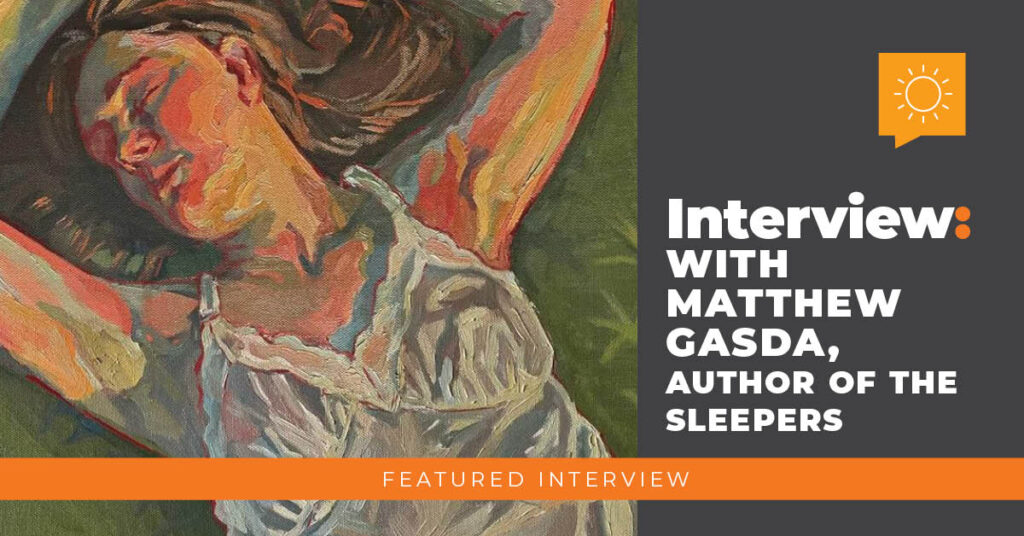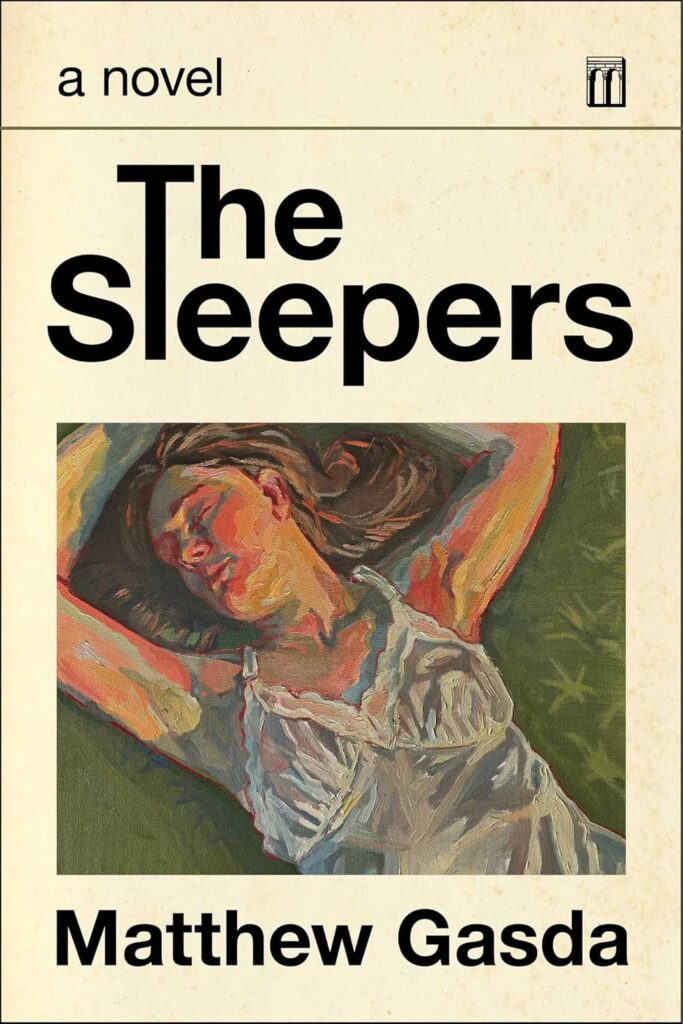Author of The Sleepers
By Michele Mathews

Matthew Gasda is an author and playwright, and his newest work is called The Sleepers. In this interview, he gives insight about his novel and what his readers can expect from him soon.
Can you tell us a little about The Sleepers and what inspired the story behind the book?
MG: One night in 2017, I was reading Anna Karenina and leapt out of bed with my own vision of a woman trapped in a relationship, of course, one deeply contemporary. I can’t really say for sure beyond that. Sometimes you start with a name, a circumstance, and you have to figure out what it means or how you can invest it with meaning.
How did you develop the central themes in The Sleepers? Were they drawn from personal experiences or more from a larger social commentary?
MG: Certain aspects of The Sleepers, like the relationship to the Internet and technology, political, and moral hypocrisy, are so indigenous to the 2010s that I have trouble saying what’s personal and what’s larger social. Certainly, the book is completely made up, and there’s nothing autobiography in it, directly; but my own sense of the texture of life in NYC comes from living here, living there at the same time as my characters.
The Sleepers has garnered a lot of attention for its unique blend of genres. How do you describe the book to someone who might not be familiar with it, and what do you think sets it apart from other works in its genre?
MG: I would push back on this in the sense that I think it’s very clearly a traditional late modernist novel, but the dialogue maybe goes on for longer than people are used to. There’s a sense of persistent dialogue-driven drama, so I would say it’s got the energy of the play even though formally it is composed just like any other mainstream novel—with prose description interrupted by dialogue. What I’m most proud of and what I do think sets it apart is the brutal almost clinical honesty in the way that my characters speak and the narrative contextualizes them. Again, maybe this reminds people of stage drama.
The setting in The Sleepers feels so immersive. What was your approach to world-building, and how do you ensure the setting becomes as much a character as the people in the story?
MG: I think I can slip inside of characters’ skins and live moment to moment as them; it’s a very cognitive approach, like forgetting the outside world, the real world, simulating someone else’s and then proceeding as logically as possible, step by step, as them. As for the setting itself, I feel like I drew on things I was very familiar with: Brooklyn apartments, Manhattan coffee shops, the subway, the Greenpoint waterfront, the experience of sitting in front of a laptop.
The characters in The Sleepers are multi-dimensional. Can you share how you approached developing their personalities and motivations?
MG: I think I mostly described this above in #4, but I think it begins with understanding the foundational details (career, age, basic emotional needs, childhood, class) and seeing how those simple operators suggest more complex emergent possibilities. Like, we’re all a collection of resume details, but we all have souls. So, I try to think about how who these characters are on paper—on their paper lives, their resumes—conflicts with deeper, more animalistic aspects of human nature. Basically, how does the universal form a tension with the particular and quotidian?
What was the writing process like for you with The Sleepers? Did you have a structured outline, or did the story evolve organically as you went along?
MG: I’ve never outlined anything! Very much organic. Usually, I have a chapter to accomplish, a zone of combat between characters, and then I think what the consequence is of that interaction, then shift my energy there. So, it evolves into big blocks of dialogue and conflict—sort of like fighting different battles in a larger war.
What challenges did you face in writing The Sleepers, and how did you overcome them?
MG: The amount of time that passed between first draft (2018 completion) and final edit of the book for publication (2024). It started as a commentary on the present (2018) but became a meditation on the past, which meant that I had to find a degree of distance and irony in the rewriting process that wasn’t fully there in the beginning. In a sense it became a different book while not changing all that much.
The pacing in The Sleepers seems carefully crafted, especially during the suspenseful moments. How do you strike a balance between tension and release?
MG: There’s not really a formula; I think it’s about getting to the point where the characters have hit an internal wall, run into their own truth or animus or anima, and can’t go further. It’s like once you’ve discovered something new and scary, it’s time to stop and move to the next moment. If you surprise yourself as a writer, then you’re likely to surprise your reader, and you shouldn’t get greedy and keep pushing for revelations.
The Sleepers explores some complex emotional and psychological dynamics. How do you approach writing about these deeper, sometimes darker aspects of the human experience?
MG: You just do it! I don’t know how surgeons perform surgery, but I guess I feel like that as a writer. When I pick up the scalpel, I’m calm; I don’t get squeamish about cutting in.
Was there a particular moment in writing The Sleepers where you realized the story had taken on a life of its own, or where something unexpected in the plot surprised you?
MG: I don’t want to give anything away, but I feel that way about the last chapter and the last few pages. There’s something new and fresh in the perspective right at the end—almost like a totally new novel is beginning.
How has your writing style evolved since The Sleepers, and are there any new techniques or approaches you’re excited to try in your future work?
MG: My next novel, as with Arcade for 2026 spring release, called Stranger Beauty, is much stranger—set in the future, with a completely different narrative technique; it’s more emotional and formally inventive and at times lyrical.
If you could see The Sleepers adapted into a movie or TV series, who would be your ideal cast for the main roles?
MG: It should be a movie, but I’m really not sure! I’m pretty bad at this. What do you think?
What do you hope readers take away from The Sleepers? Are there particular emotions or questions you wanted to provoke?
MG: We are more historically and socially conditioned than we realize, but we are more creative than we realize. Don’t be Dan! Don’t be Mariko! Write your own life more actively than they do! Escape your author.
Finally, what’s next for you? Are you working on any new projects or ideas that you’re excited to share.
MG: A new play called Over the Moon, potentially a Dimes Square film adaptation, and I’m working on an untitled long family saga novel.

The Sleepers
Matthew Gasda
A Contemporary Tragedy in a Classic Style
Four New Yorkers’ paths collide in the days ahead of the 2016 election. Dan teaches Marxism while secretly courting a student. His girlfriend Mariko, an actress, finds refuge in her dying mentor’s bed. When her sister, Akari, arrives from LA—in flight from her own dead-end romance—she becomes the unwitting witness to their mutual destruction . . .
In crystalline prose, Gasda maps the territory between who we pretend to be and who we are—and how far we are willing to go when we think the internet isn’t looking. The Sleepers, a ruthless portrait of educated Millennials who know better but act worse, throws a jagged, electric light on how desire upends our carefully curated social personas.

